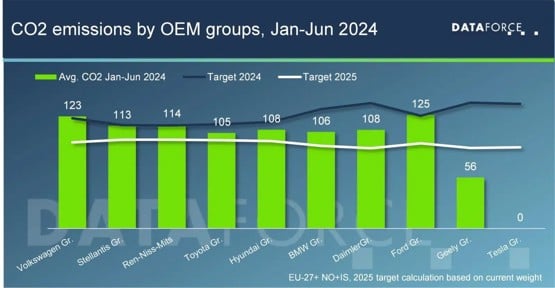Major players like Volkswagen Group and Ford are facing significant challenges to meet new European Union (EU) regulations that require car makers to significantly reduce the average emissions of their fleets, according to a new report by Dataforce.
With the European Union poised to drastically tighten CO2 emission targets for car manufacturers in 2025, the largest Original Equipment Manufacturers (OEMs) could face steep financial penalties that could total hundreds of millions of euros.
Beginning in 2025, car manufacturers in the EU will be required to reduce average CO2 emissions for passenger cars from 116 g/km in 2024 to below 93.6 g/km - a reduction of 19%.
Major players like Volkswagen Group and Ford are facing significant challenges to meet new European Union (EU) regulations that require car makers to significantly reduce the average emissions of their fleets, according to a new report by Dataforce.
With the European Union poised to drastically tighten CO2 emission targets for car manufacturers in 2025, the largest Original Equipment Manufacturers (OEMs) could face steep financial penalties that could total hundreds of millions of euros.
Beginning in 2025, car manufacturers in the EU will be required to reduce average CO2 emissions for passenger cars from 116 g/km in 2024 to below 93.6 g/km - a reduction of 19%.

Light commercial vehicles will face a similar cut, with targets decreasing from 185 to 154 g/km. Failure to meet these targets will result in fines calculated at 95 euros for every gramme of CO2 above the limit, multiplied by the number of vehicles sold, leading to potential penalties in the hundreds of millions.
Despite the impending regulations, progress in reducing CO2 emissions has been sluggish. In the first half of 2024, emissions actually increased compared to the previous year.
While Battery Electric Vehicles (BEVs) and Plug-in Hybrid Electric Vehicles (PHEVs) offer the greatest potential for reducing emissions, their market growth has stalled due to recent subsidy cuts and consumer scepticism.
Meanwhile, the European car market has grown, but much of this increase has been driven by full hybrids, which, though more efficient, still emit more CO2 than the average target for passenger cars.
Among OEMs, only a few are on track to meet the 2025 targets. Geely, which owns Volvo and Polestar, and China’s SAIC Group, parent company of MG, are currently below the required threshold of 93.6 g/km.
Toyota and BMW are also relatively close, needing only moderate reductions. However, major players like Volkswagen Group and Ford are facing significant challenges. Known for producing heavier vehicles, both have been allowed slightly higher emissions targets in 2024, although this advantage will disappear in 2025.
To meet the 2025 targets, OEMs must now dramatically increase EV sales. For manufacturers without full hybrids in their lineup, BEVs and PHEVs will need to account for 37% of their sales. Those with a substantial hybrid presence could reduce this requirement to 23%, but these companies typically sell fewer BEVs.
One potential strategy for meeting CO2 targets is CO2 pooling, where manufacturers combine their emissions figures to achieve a lower overall average. This approach saw limited use in recent years but is expected to make a comeback in 2025. EV-only manufacturers may also sell emissions credits to those struggling to meet their targets, providing a financial lifeline.
Continuous CO2 monitoring will be critical as manufacturers seek to align their sales strategies with emissions targets.
With consumer incentives for EVs dwindling, OEMs must find new ways to attract buyers to BEVs. This could involve cutting prices, scaling up production, and transitioning to less expensive battery technologies.
Additionally, phasing out promotions for internal combustion engine vehicles and introducing smaller, more affordable electric models could help make EVs more appealing.
Read Manufacturers poised to meet zero-emission mandate amid EV sales struggles
Login to continue reading
Or register with AM-online to keep up to date with the latest UK automotive retail industry news and insight.
















Login to comment
Comments
No comments have been made yet.